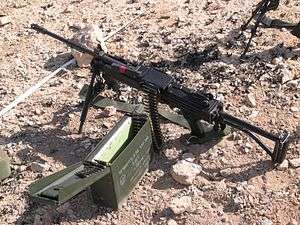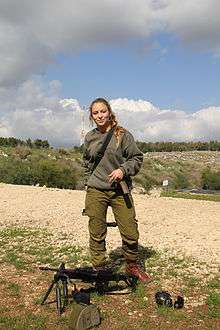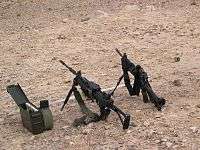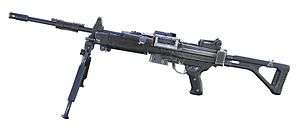IMI Negev
| Negev | |
|---|---|
|
The IMI Negev LMG | |
| Type |
Light machine gun Medium machine gun |
| Place of origin | Israel |
| Service history | |
| In service | 1997–present[1] |
| Used by | See Users |
| Wars |
Al-Aqsa Intifada 2006 Lebanon War Gaza War War in Donbass |
| Production history | |
| Designer | Israel Military Industries Ltd (IMI) |
| Designed | 1985–1990 |
| Manufacturer | Israel Military Industries Ltd (currently Israel Weapon Industries Ltd) |
| Produced | 1995–present |
| Variants |
Negev Commando Negev NG7 |
| Specifications | |
| Weight |
7.40 kg (16.31 lb) (standard version) 7.00 kg (15.43 lb) (Negev Commando) 7.60 kg (16.8 lb) (NG7) |
| Length |
1,020 mm (40 in) stock extended / 890 mm (35.0 in) stock folded (standard version) 780 mm (30.7 in) stock deployed / 680 mm (26.8 in) stock folded (Negev Commando) |
| Barrel length |
460 mm (18.1 in) (standard version) 330 mm (13.0 in) (Negev Commando) |
|
| |
| Cartridge | 5.56×45mm NATO, 7.62×51mm NATO(NG7 variant) |
| Action | Gas operated, rotating bolt |
| Rate of fire | 1000 rounds/min |
| Muzzle velocity |
915 m/s (3,002 ft/s) (standard version) 850 m/s (2,788.7 ft/s) (Negev Commando) |
| Effective firing range |
300–1000 m sight adjustments (standard version) 300-800 m sight adjustments (Negev Commando) |
| Feed system | 150-round M27 ammunition belt or 35-round box magazine |
| Sights | Aperture, with elevation drum and adjustable front post, folding tritium night sights, various optional optics via picatinny rail |



The Negev is an Israeli 5.56 mm and 7.62 mm light machine gun, developed by Israel Military Industries Ltd. (IMI) of Ramat HaSharon (now Israel Weapon Industries), as a replacement for the 5.56 mm Galil ARM light machine gun, whose barrel would overheat easily during sustained fire. Design work on this new indigenous firearm began in 1985, it was inspired by the Belgian FN Minimi,[2] and it was officially adopted by the Israeli Defense Forces (IDF) in 1997. In 2012, IWI introduced the new Negev NG7, in 7.62mm calibre, to become the standard issue for the IDF.
Design details
The Negev is a gas-operated selective fire firearm that uses propellant gases from the barrel to cycle a short-stroke gas piston operating system under the barrel and a rotary bolt locking mechanism. The bolt itself features 4 radial locking lugs that engage the barrel extension and its rotation is controlled by a pin on the bolt body, which rides inside a camming guide machined into the bolt carrier. The bolt contains a spring-powered casing extractor unit, while a lever ejector is housed inside the receiver (it is rotated by the recoiling bolt carrier).
Gas regulator
The Negev’s adjustable gas regulator has three settings: “1” is used exclusively when feeding from a magazine (the weapon’s rate of fire in this mode is 850–1,150 rounds/min), setting “2” is used in normal operating conditions when feeding from a belt (rate of fire: 850–1,150 rounds/min) and setting “3” which is used under adverse operating conditions, such as in the presence of dust, dirt or heavy fouling (cyclic rate of fire is 950-1,150 rounds/min). Early prototypes used a different 3-position gas adjustment system: setting “1”—normal operation; setting “2”—for adverse environmental conditions; and setting “3”—isolates the gas system, used to launch rifle grenades with the use of a grenade-launching blank cartridge drawn from a special 12-round magazine (from the Galil rifle).
Striker
The Negev is striker-fired, where the bolt carrier assembly acts as the striker. The light machine gun fires from an open bolt position. A lever-type fire control selector switch is provided (“A”—full-automatic fire, “R”—semi-automatic fire), installed on the left side of the pistol grip, which doubles as a manual safety against accidental firing. The safe “S” position disables the sear mechanism (which makes it impossible to cock the bolt carrier), by lifting the lever responsible for holding the bolt carrier in the forward position and disconnects the trigger mechanism from the sear. The weapon can be secured safe regardless of the position of the bolt carrier group. The cocking handle is equipped with a ratcheting mechanism that immobilizes the partially cocked bolt carrier.
Ammunition
The Negev feeds from an M27 disintegrating, open-link ammunition belt, carried in a 150-round fabric container that clips into the magazine well or alternately from a 35-round box magazine from the Galil assault rifle or a 30-round STANAG magazine from the M16 rifle (with the use of an adapter). 200-round ammunition belt containers are also available. Belted ammunition is introduced into the feed tray port from the left side, while the magazine is inserted vertically into the magazine well at the base of the receiver. The feed system uses a pawl feeding mechanism, driven by the recoiling bolt carrier, but the belt is moved only during the rearward movement of the bolt carrier. The non-reciprocating charging handle is located on the right side of the weapon.
Barrel
The Negev has a quick-change chrome-lined barrel that is manufactured using a cold hammer forging process. The barrel is fitted with a slotted flash suppressor and a fixed carry handle, which is used to transport the weapon and change-out an overheated barrel. The barrel can be changed only after lifting open the feed tray cover.
During the weapon’s initial development a barrel with a 1 in 305 mm (1:12 in) rifling twist rate was also planned, adapted for the lightweight M193 cartridge. Additionally, a multifunction muzzle device was designed, used to launch rifle grenades.
Sight
The Negev’s iron sights (closed-type) consist of a front post (adjustable for both windage and elevation) and a rear aperture sight with an elevation adjustment drum, with 300 to 1,000 m range settings. For night-time operation the weapon is equipped with gaseous tritium-illuminated vials (supplied by Betalight): one installed in the front sight post, and two—on a notch sight under the standard aperture sight arm (before use, the rear sight leaf is pivoted forward to expose the night notch sight). A rail is integrated into the receiver top cover that allows optical day and night-time sights to be mounted to the weapon. The barrel can also be optionally fitted with mounting hardware that would allow the Negev to mount a laser pointer or reflex sight.
The machine gun has a metal side-folding (right side) stock and a removable bipod, installed to the forward end of the handguard and folded under the handguard when stowed. The receiver also has slots and hooks used to secure the weapon to vehicle mounting hardware.
Cartridges
The Negev uses the 5.56×45mm NATO cartridge and is optimized for the SS109 bullet. Field maintenance involves stripping the weapon down to six main groups: the barrel, stock, bolt carrier, bolt, bipod and return mechanism. All parts, including the quick-change barrels, are fully interchangeable.
Variants

The Negev Commando is a shorter and lighter version of the standard Negev light machine gun, known also as the Assault Negev. After the privatization of the Magen Light Weapon Division when company's name was changed to Israel Weapon Industries (IWI) the name of the Negev Commando was changed as well to Negev SF (Special Forces). On this model the barrel is shortened to 330 mm (13.0 in), a bipod is optional and the stock folds to the left side, so that the overall length with the butt folded is only 680 mm (26.8 in). For the assault role a side-mounted forward grip is provided for the user's left hand, allowing the weapon to be fired from the hip. Weight of the Negev SF with a 150-round drum is 9.55 kg (21.1 lb). Vehicle, AFV and helicopter mountings are available. This variant underwent trials with IDF special forces during late 1998.
In March 2012, IWI introduced the Negev NG7, a derivative of the Negev machine gun in the 7.62mm NATO caliber.[3] The Negev NG7 first saw combat during Operation Protective Edge (2014) and received good reviews for reliability, dependence and performance from IDF fighters.[4]
Users
 Azerbaijan[5]
Azerbaijan[5] Colombia[1]
Colombia[1] Costa Rica[1]
Costa Rica[1] Equatorial Guinea[6]
Equatorial Guinea[6] Estonia[1][7]
Estonia[1][7] Georgia[8] Since May 2010, standard issue light machine gun of the GAF.
Georgia[8] Since May 2010, standard issue light machine gun of the GAF. India[1][9]
India[1][9] Israel: Negev adopted by the Israel Defense Forces in 1997.[1][10] Negev NG7 adopted in 2012.[11]
Israel: Negev adopted by the Israel Defense Forces in 1997.[1][10] Negev NG7 adopted in 2012.[11] Mexico: Mexican Federal Police[12]
Mexico: Mexican Federal Police[12] Republic of Macedonia: Police Special Forces
Republic of Macedonia: Police Special Forces Paraguay: Paraguayan Army.[13]
Paraguay: Paraguayan Army.[13] Thailand: Purchased 1,000 machine guns in 2007, and another 550 in 2008.[14]
Thailand: Purchased 1,000 machine guns in 2007, and another 550 in 2008.[14] Vietnam: In service with Naval Special Forces.[15]
Vietnam: In service with Naval Special Forces.[15] Ukraine (known as Fort-401)
Ukraine (known as Fort-401)
See also
Notes
- 1 2 3 4 5 6 Kemp, Ian (March 2007). "Lightweight Firepower" (PDF). Asianmilitaryreview.com - Asian Military Review. Retrieved 2010-04-18.
- ↑ James H. Willbanks, 2004."Machine Guns: An Illustrated History of Their Impact". ABC-CLIO. Retrieved 2015-06-30.
- ↑ The Next Gen 7.62mm NEGEV NG7 Machine Gun - Thefirearmblog.com, March 6, 2012
- ↑ לחימה אורבנית: המערכות החדישות שנכנסו לפעולה בלחימה בעזה, IsraelDefense, 18 September 2014.
- ↑ "News.Az - Azerbaijan buys great deal of weapons from Israel last year". news.az.
- ↑ Israeli arms transfers to sub-Saharan Africa
- ↑ "Eesti Kaitsevägi - 5,56 mm kergekuulipilduja Negev - Kaitsevägi". Mil.ee. Retrieved 2016-03-25.
- ↑ "Negev in Georgian army". Mod.gov.ge. Retrieved 2012-06-09.
- ↑ http://forums.bharat-rakshak.com/viewtopic.php?f=3&t=1944&start=2520. Missing or empty
|title=(help) - ↑ Hogg, Ian (2002). Jane's Guns Recognition Guide. Jane's Information Group. ISBN 0-00-712760-X.
- ↑ Negev NG7 - Israel-Weapon.com
- ↑ Mexican Federal Police Using IWI Negev Machine Gun - Thefirearmblog.com, 2 August 2013
- ↑ "Conectarse". Paraguaydefensa.foroactivo.com. Retrieved 2012-06-09.
- ↑ http://www.asianmilitaryreview.com/CurrentIssue/dl.php?filename=201003140001071.pdf
- ↑ "Những bức ảnh về Quân Đội Nhân Dân Việt Nam (Phần 4) - Trang 480". TTVNOL. Retrieved 2012-06-09.
External links
| Wikimedia Commons has media related to IMI Negev. |
- The Negev in IMI official website:
- Israeli-Weapons
- Modern Firearms

.jpg)